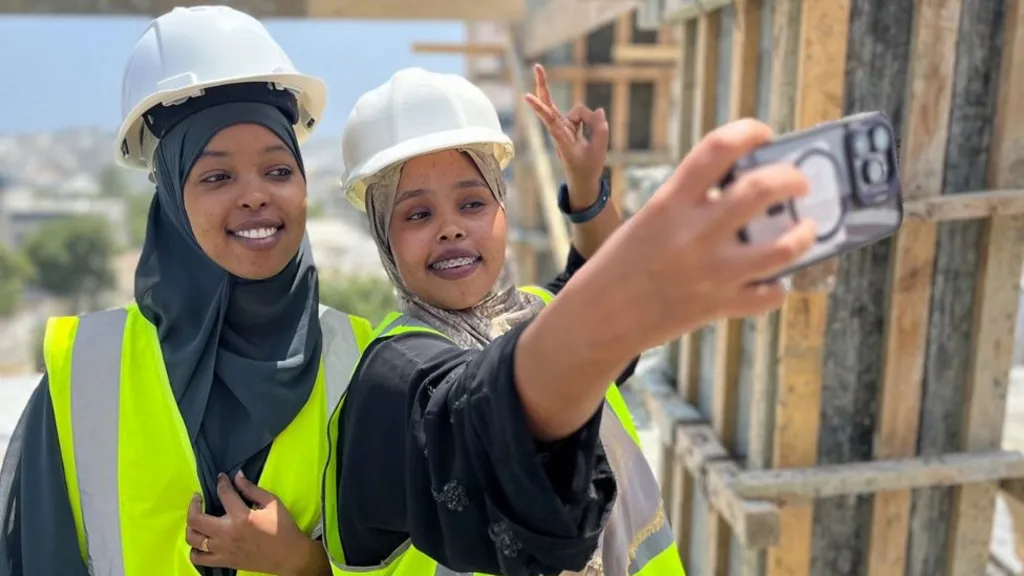CONSTRUCTION is booming in Somalia’s capital city and as Mogadishu literally rises from the ashes of its violent past it is also giving unexpected opportunities to women like Fathi Mohamed Abdi and Saadia Ahmed Omar.
The two young female engineers have been overseeing the construction of a 10-floor apartment complex in Taleh in the city’s Hodan District.
Wearing hard hats they navigate their way through construction material, issuing instructions to a team of workers – all of whom are men.
“When I started, people doubted me,” 24-year-old Ms Abdi, the chief operating officer of Arkan Engineering Services, a Somali-owned construction company, tells the BBC.
“They would ask, ‘How can we trust a house built by a woman? How can I trust my money and property with a young female engineer?'”
She and her colleague Ms Omar have been practising engineers for the last five years.
“Mogadishu needs us,” says Ms Omar, who is also 24. “When I was young, this city was in chaos. Now, we are part of its reconstruction.”
Somalia, a former Italian colony, has experienced a prolonged period of civil war after the government of President Siad Barre collapsed in January 1991.
Even now, scars of decades of war are still visible – like in the central district of Shangani where there are bombed-out buildings. But the ruins are becoming hidden or replaced by tall office complexes and apartments, and a skyline dotted with cranes and scaffolding.
Both young women were born during the civil war and grew up witnessing their country fragmenting. While many Somalis chose to leave, they stayed, driven by a passion to rebuild, despite the fact that an insurgency was being waged by al-Shabab, a group linked to al-Qaeda.
“I think part of the reason women are getting more chances in this field is because there’s so much work to do, and not enough professionals to do it. That creates space for us,” Ms Omar says.
Ibrahim Abdi Heyle, chairman of the Somali Engineers Association, agrees the high demand for skilled professionals is leading to change – even if slowly in Somalia’s traditionally male-dominated society.
“With numerous ongoing infrastructure, energy, and technology projects, the workload has significantly increased. As a result, the association actively encourages greater participation from women, emphasising that they are not only welcomed but also vital in filling critical gaps in the workforce,” the 34-year-old says.
“The association believes that empowering women in engineering not only helps meet the growing demand but also brings diverse perspectives and innovative solutions to the industry.”
According to the office of the mayor of Mogadishu, over the last five years, more than 6,000 buildings have been constructed, marking a significant change in the city’s landscape.
“Security in Mogadishu has improved, leading to an increase in high-rise and commercial buildings,” says Salah Hassan Omar, the mayor’s spokesperson.
Nonetheless it has not been an easy path for Ms Abdi and Ms Omar as only 5% of engineers are women – and they often find opportunities for mentorship are scarce.
“When I applied for internships, most companies rejected me,” Ms Omar recalls. “They didn’t think a woman could handle the physical demands of engineering. I searched for three months before someone finally gave me a chance.”
Today, the two are among the most recognised female engineers in Mogadishu, having overseen more than 30 multimillion-dollar projects.
“The city is now home to taller buildings and modern infrastructure, a stark contrast to the Mogadishu of the past,” Ms Abdi says proudly.







